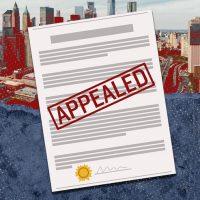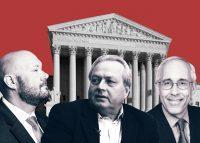When landlord groups filed a federal lawsuit challenging New York’s rent law last year, they already had their eyes on the U.S. Supreme Court. Now, with the appointment of a sixth conservative judge, their case may have a better shot at being heard by the nation’s highest court.
Amy Coney Barrett was sworn in Monday night as the 115th justice in the court’s history. Her confirmation creates a 6-3 majority of Republican-appointed justices, a shift that could pave the way for various conservative goals, including dismantling the Affordable Care Act and overturning Roe v. Wade. Though rent regulation didn’t come up during Barrett’s confirmation hearings, a conservative majority may be more willing to take up the issue.
Read more


Two landlord groups, the Community Housing Improvement Program and the Rent Stabilization Association, filed a lawsuit challenging New York’s Housing Stability and Tenant Protection Act last July, alleging that it represents an unlawful taking of private property and violates the Fourteenth Amendment’s due process clause because it infringes upon property rights without addressing a “compelling state interest.”
“I’m not sure that the modern Supreme Court with Justice Barrett on it is going to be acquiescing quite as much to the idea that simply because there’s a public purpose behind changing a contract that it is ok,” said Jim Burling, vice president of legal affairs at Pacific Legal Foundation, a libertarian legal group. The organization supported a challenge to the state’s rent law that the Supreme Court declined to hear in 2011.
Among the 2019 rent law’s provisions most vulnerable to being overturned, he said, is one that delays eviction for one year if a tenant can demonstrate an “inability to obtain other housing or to prevent hardship.” Burling noted that Barrett is a protégé of the late Justice Antonin Scalia, who opposed a similar provision in a California rent control ordinance, which was the subject of a 1988 Supreme Court decision. Still, he said, demonstrating an illegal taking will be no easy task.
“It is going to be a tough battle, even with Justice Barrett,” Burling said.
The CHIP and RSA lawsuit is a long way from the Supreme Court, and might never get there. In September, a federal court judge dismissed the case, a decision that the groups swiftly appealed.
“We think there is a good basis for the court, the Second Circuit, taking a fresh look at the law,” said Andrew Pincus, an attorney for the groups. Last November, the Senate confirmed two judges nominated by President Donald Trump to the Second Circuit of the U.S. Court of Appeals, flipping the court’s majority in favor of Republican appointees.
Earlier this month, Ellen Davidson, an attorney at the Legal Aid Society, which is a party to case, said she is confident that even with a conservative majority, the Supreme Court likely will not overturn decades’ worth of case law related to rent regulation.
“I guess the question is: How much does the Supreme Court want to blow up our understanding of law over the last century?” she said.
“It would completely change the relationship between government and business. A law that requires businesses not to dump toxins into the East River, the Hudson River would be challenged. Anything that made businesses less profitable would be, under that theory, a taking, and therefore unconstitutional.”
